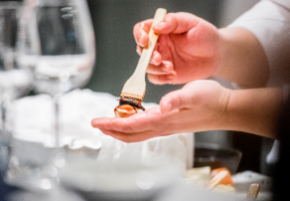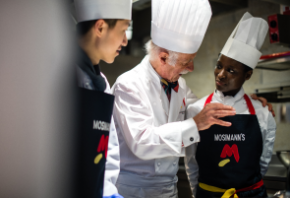- About
- Programs
- Campus Life
- Career Services
- Admissions
- News & Events
- Alumni
How to Open a Restaurant: Step-by-Step Guide
How to Open a Restaurant: Step-by-Step Guide
Learn how to start a restaurant with our comprehensive step-by-step guide. From market research to permits, business planning to menu design, hiring staff to marketing strategies, optimize your chances of success in the restaurant industry.
If you're looking to learn how to start a restaurant, you're in the right place. Owning and operating a successful restaurant requires careful planning and execution. In this comprehensive guide, we'll cover the essential steps, from market research to obtaining permits, creating a business plan, finding the perfect location, hiring staff, designing your menu, and marketing your restaurant. Let's dive in and optimize your chances of success!
- Conducting Market Research and Defining Your Restaurant Concept: The first step in starting a restaurant is conducting thorough market research to identify your target audience, assess the competition, and define your unique restaurant concept. This includes choosing the right cuisine, pricing, and positioning in the market to differentiate your restaurant.
- Crafting a Solid Business Plan: A well-crafted business plan is vital for the success of your restaurant. It should outline your restaurant's vision, mission, financial projections, marketing strategies, and operational details. A comprehensive business plan will serve as a roadmap and also help you secure financing from potential investors or lenders.
- Obtaining Permits and Licenses: Starting a restaurant involves navigating various legal requirements, including obtaining permits and licenses. This may include a business license, food service permit, liquor license, health department permits, and more. It's important to familiarize yourself with local regulations and ensure you obtain all necessary permits and licenses to operate your restaurant legally.
- Finding the Perfect Location: Location is a critical factor in the success of your restaurant. Research and select a location that is easily accessible, has high foot traffic, complements your restaurant concept, and offers adequate parking. Negotiate favorable lease terms and carefully review the lease agreement before signing.
- Designing Your Menu and Kitchen: Your restaurant's menu and kitchen layout are crucial to its success. Create a well-curated menu that aligns with your restaurant concept, offers variety, and caters to your target audience. Additionally, design an efficient kitchen layout that maximizes productivity and meets health and safety regulations.
- Hiring and Training Staff: Building a skilled and motivated team is essential for your restaurant's success. Develop a recruitment strategy, conduct thorough interviews, and hire staff members who align with your restaurant's values and culture. Provide comprehensive training to ensure your staff is well-equipped to deliver excellent service and maintain high-quality standards.
- Implementing Effective Marketing Strategies: Marketing is vital to attract customers to your restaurant. Develop a comprehensive marketing plan that includes online and offline strategies such as SEO, social media marketing, email marketing, traditional advertising, public relations, and more. Establish a strong online presence, engage with your target audience, and create awareness to drive traffic to your restaurant.
Starting a restaurant can be a challenging but fulfilling venture. By following this step-by-step guide and implementing effective online and offline strategies, you can optimize your chances of success in the competitive restaurant industry. However, what sets apart truly exceptional restaurants are the skills and knowledge acquired through proper culinary education. Students who study with Culinary Arts Academy Switzerland not only gain expertise in culinary techniques, flavor combinations, and menu development but also learn the skills that differentiate them from others in the industry. Remember to continually assess and adjust your strategies as you progress, and always prioritize quality and customer satisfaction.
If you are seeking a program that can provide you with the necessary skills and knowledge to excel in the culinary arts field, then our BA in Culinary Arts or MA in Culinary Business Management are excellent choices. These programs offer comprehensive curricula that equip you with the fundamental skills needed in the kitchen and in running a successful culinary business. You also acquire the entrepreneurial skills needed to launch and manage your own restaurant. You are challenged to continually strive to up your game by our team of highly experienced chef instructors who have worked in some of the world's most prestigious kitchens, including five-star hotels and Michelin-starred restaurants.



















